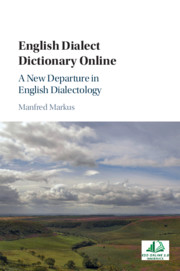Book contents
- English Dialect Dictionary Online
- English Dialect Dictionary Online
- Copyright page
- Contents
- Figures
- Tables
- Preface
- Acknowledgements
- Note on the Text
- 1 Introduction
- 2 Orthography
- 3 Tagging
- 4 The Syntax of EDD Entries, and How to Describe It
- 5 Some Practical Suggestions in Hindsight
- 6 The Interface
- 7 Retrieval Window (Advanced Mode)
- 8 Research Issues Encouraged by EDD Online
- 9 Focus on Quantification
- 10 Final Remarks on the Accessibility and Impact of EDD Online
- Appendix
- References
- Index
8 - Research Issues Encouraged by EDD Online
Published online by Cambridge University Press: 28 January 2021
- English Dialect Dictionary Online
- English Dialect Dictionary Online
- Copyright page
- Contents
- Figures
- Tables
- Preface
- Acknowledgements
- Note on the Text
- 1 Introduction
- 2 Orthography
- 3 Tagging
- 4 The Syntax of EDD Entries, and How to Describe It
- 5 Some Practical Suggestions in Hindsight
- 6 The Interface
- 7 Retrieval Window (Advanced Mode)
- 8 Research Issues Encouraged by EDD Online
- 9 Focus on Quantification
- 10 Final Remarks on the Accessibility and Impact of EDD Online
- Appendix
- References
- Index
Summary
Recently, there have been some promising studies on regional dialects in English-speaking countries, for example, Braber and Robinson (2018) on East Midland English, published within the Dialects of English series by Walter de Gruyter. However, nearly all of these publications, including those of the series mentioned, refer to English varieties outside England. By and large, the study of traditional English dialects cannot claim in 2019 to be a mainstream field of English linguistics, at least not to the extent that it did in former university teaching. Certainly, one of the reasons is the predominant interest in sociolinguistics, particularly in England and the US. This strong interest can be interpreted as an answer to the growing role of social factors, classes and awareness in our Western world since the nineteenth century. Another reason for the loss of prestige of traditional dialects is the new focus on the ‘many Englishes’ worldwide, which is mainly due to the Western post-colonial heritage and now, more generally, to globalisation. These trends, detrimental to a scholarly interest in traditional dialectology, have been enhanced by the great weight of synchronic linguistics in contrast to diachronic linguistics in this and the last centuries. Traditional dialects have always been rooted in diachronic linguistics and also for this reason have lost curricular ground.
- Type
- Chapter
- Information
- English Dialect Dictionary OnlineA New Departure in English Dialectology, pp. 96 - 141Publisher: Cambridge University PressPrint publication year: 2021

